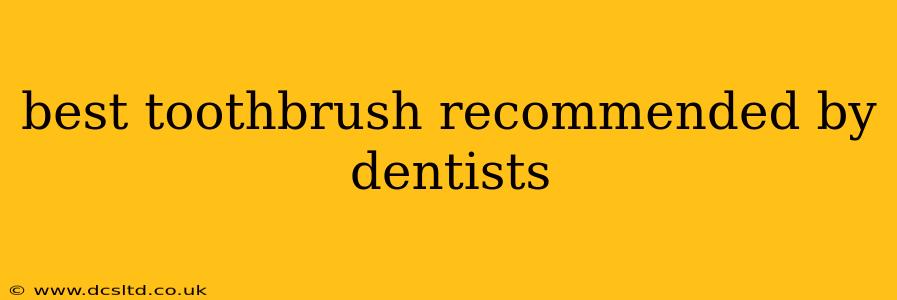Choosing the right toothbrush can significantly impact your oral health. While there's no single "best" toothbrush universally endorsed by all dentists, certain features and types consistently receive high recommendations. This guide will explore the key factors dentists consider when recommending toothbrushes and highlight some top choices based on various needs.
What Makes a Toothbrush Dentist-Recommended?
Dentists prioritize toothbrushes that effectively remove plaque and debris while minimizing gum irritation and enamel damage. Here's what they look for:
-
Brush Head Size: A smaller brush head (around ½ inch wide) allows for better access to all areas of the mouth, particularly hard-to-reach back molars. Larger heads can be less effective and may lead to rushed brushing.
-
Bristle Type and Hardness: Soft-bristled brushes are generally preferred. Medium or hard bristles can damage enamel and gums over time. Look for rounded bristles to minimize abrasion. Some dentists recommend brushes with end-rounded filaments for even gentler cleaning.
-
Handle Design: A comfortable and ergonomic handle allows for a better grip and control during brushing. This is crucial for effective plaque removal and preventing excessive force.
Types of Toothbrushes Dentists Recommend
Several types of toothbrushes cater to different preferences and needs:
-
Manual Toothbrushes: These remain a popular and effective choice. The key is selecting a toothbrush with soft bristles and a comfortable handle.
-
Electric Toothbrushes: Electric toothbrushes, especially those with oscillating-rotating or sonic vibrations, can be more effective at plaque removal than manual toothbrushes, particularly for individuals with dexterity issues or those prone to gingivitis. Many models offer features like pressure sensors to prevent over-brushing. Look for ones with a timer to ensure you brush for the recommended two minutes.
-
Power Toothbrushes: These are a type of electric toothbrush. The key difference is the way they move. Power toothbrushes often use a combination of oscillating, rotating, and pulsating actions to clean teeth.
What do Dentists Say About Specific Brands?
While dentists don't typically endorse specific brands, they often recommend toothbrushes based on the features mentioned above. Looking for a toothbrush with soft bristles, a small head, and a comfortable handle will align with most dental professionals' recommendations, regardless of the brand.
How Often Should You Replace Your Toothbrush?
Dentists recommend replacing your toothbrush every three to four months, or sooner if the bristles are frayed or worn. Frayed bristles are less effective at cleaning and can damage gums.
What About Toothbrush Technology?
Some electric toothbrushes incorporate advanced features like pressure sensors, timers, and even Bluetooth connectivity to track brushing habits. While these features can be beneficial, they are not essential for effective brushing. The fundamental aspects remain: soft bristles, proper technique, and a thorough two-minute brushing session.
What About Interdental Brushes (Interdental Cleaners)?
Interdental brushes are small cylindrical brushes designed to clean between teeth, reaching areas a regular toothbrush might miss. Dentists often recommend these for individuals with wider spaces between teeth or those with dental appliances like braces or implants. They are used in addition to regular brushing.
Are There Toothbrushes Specifically for Sensitive Teeth?
Yes, some toothbrushes are designed with extra-soft bristles and gentle cleaning actions to minimize irritation for individuals with sensitive teeth and gums.
How to Brush Your Teeth Properly: The Dentist's Advice
Beyond the choice of toothbrush, proper brushing technique is crucial. Use gentle, short strokes, angling the brush at a 45-degree angle towards the gumline. Brush all surfaces of each tooth, including the chewing surfaces, inner surfaces, and outer surfaces. Don't forget your tongue!
This guide provides valuable insights into selecting the best toothbrush based on dental recommendations. Remember to consult your dentist for personalized advice based on your individual oral health needs. They can assess your specific situation and recommend the most suitable toothbrush and brushing technique for optimal oral hygiene.
